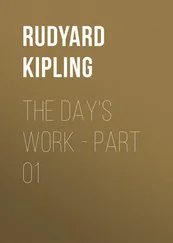Джозеф Киплинг - The Day's Work - Volume 1
Здесь есть возможность читать онлайн «Джозеф Киплинг - The Day's Work - Volume 1» весь текст электронной книги совершенно бесплатно (целиком полную версию без сокращений). В некоторых случаях можно слушать аудио, скачать через торрент в формате fb2 и присутствует краткое содержание. Год выпуска: 2014, Издательство: epubBooks Classics, Жанр: Прочие приключения, на английском языке. Описание произведения, (предисловие) а так же отзывы посетителей доступны на портале библиотеки ЛибКат.
- Название:The Day's Work - Volume 1
- Автор:
- Издательство:epubBooks Classics
- Жанр:
- Год:2014
- ISBN:нет данных
- Рейтинг книги:3 / 5. Голосов: 1
-
Избранное:Добавить в избранное
- Отзывы:
-
Ваша оценка:
- 60
- 1
- 2
- 3
- 4
- 5
The Day's Work - Volume 1: краткое содержание, описание и аннотация
Предлагаем к чтению аннотацию, описание, краткое содержание или предисловие (зависит от того, что написал сам автор книги «The Day's Work - Volume 1»). Если вы не нашли необходимую информацию о книге — напишите в комментариях, мы постараемся отыскать её.
The Day's Work - Volume 1 — читать онлайн бесплатно полную книгу (весь текст) целиком
Ниже представлен текст книги, разбитый по страницам. Система сохранения места последней прочитанной страницы, позволяет с удобством читать онлайн бесплатно книгу «The Day's Work - Volume 1», без необходимости каждый раз заново искать на чём Вы остановились. Поставьте закладку, и сможете в любой момент перейти на страницу, на которой закончили чтение.
Интервал:
Закладка:
The impenetrability of this regulated life irritated him, and he strove to learn something of the human side of these people. He retired baffled, to be trained by his menials. In America, the native demoralises the English servant. In England, the servant educates the master. Wilton Sargent strove to learn all they taught as ardently as his father had striven to wreck, before capture, the railways of his native land; and it must have been some touch of the old bandit railway blood that bade him buy, for a song, Holt Hangars, whose forty–acre lawn, as every one knows, sweeps down in velvet to the quadruple tracks of the Great Buchonian Railway. Their trains flew by almost continuously, with a bee–like drone in the day and a flutter of strong wings at night. The son of Merton Sargent had good right to be interested in them. He owned controlling interests in several thousand miles of track,—not permanent way,—built on altogether different plans, where locomotives eternally whistled for grade–crossings, and parlor–cars of fabulous expense and unrestful design skated round curves that the Great Buchonian would have condemned as unsafe in a construction–line. From the edge of his lawn he could trace the chaired metals falling away, rigid as a bowstring, into the valley of the Prest, studded with the long perspective of the block signals, buttressed with stone, and carried, high above all possible risk, on a forty–foot embankment.
Left to himself, he would have builded a private car, and kept it at the nearest railway–station, Amberley Royal, five miles away. But those into whose hands he had committed himself for his English training had little knowledge of railways and less of private cars. The one they knew was something that existed in the scheme of things for their convenience. The other they held to be "distinctly American"; and, with the versatility of his race, Wilton Sargent had set out to be just a little more English than the English.
He succeeded to admiration. He learned not to redecorate Holt Hangars, though he warmed it; to leave his guests alone; to refrain from superfluous introductions; to abandon manners of which he had great store, and to hold fast by manner which can after labour be acquired. He learned to let other people, hired for the purpose, attend to the duties for which they were paid. He learned—this he got from a ditcher on the estate—that every man with whom he came in contact had his decreed position in the fabric of the realm, which position he would do well to consult. Last mystery of all, he learned to golf—well: and when an American knows the innermost meaning of "Don't press, slow back, and keep your eye on the ball," he is, for practical purposes, denationalised.
His other education proceeded on the pleasantest lines. Was he interested in any conceivable thing in heaven above, or the earth beneath, or the waters under the earth? Forthwith appeared at his table, guided by those safe hands into which he had fallen, the very men who had best said, done, written, explored, excavated, built, launched, created, or studied that one thing—herders of books and prints in the British Museum; specialists in scarabs, cartouches, and dynasties Egyptian; rovers and raiders from the heart of unknown lands; toxicologists; orchid–hunters; monographers on flint implements, carpets, prehistoric man, or early Renaissance music. They came, and they played with him. They asked no questions; they cared not so much as a pin who or what he was. They demanded only that he should be able to talk and listen courteously. Their work was done elsewhere and out of his sight.
There were also women.
"Never," said Wilton Sargent to himself, "has an American seen England as I'm seeing it"; and he thought, blushing beneath the bedclothes, of the unregenerate and blatant days when he would steam to office, down the Hudson, in his twelve–hundred–ton ocean–going steam–yacht, and arrive, by gradations, at Bleecker Street, hanging on to a leather strap between an Irish washerwoman and a German anarchist. If any of his guests had seen him then they would have said: "How distinctly American!" and—Wilton did not care for that tone. He had schooled himself to an English walk, and, so long as he did not raise it, an English voice. He did not gesticulate with his hands; he sat down on most of his enthusiasms, but he could not rid himself of The Shibboleth. He would ask for the Worcestershire sauce: even Howard, his immaculate butler, could not break him of this.
It was decreed that he should complete his education in a wild and wonderful manner, and, further, that I should be in at that death.
Wilton had more than once asked me to Holt Hangars, for the purpose of showing how well the new life fitted him, and each time I had declared it creaseless. His third invitation was more informal than the others, and he hinted of some matter in which he was anxious for my sympathy or counsel, or both. There is room for an infinity of mistakes when a man begins to take liberties with his nationality; and I went down expecting things. A seven–foot dog–cart and a groom in the black Holt Hangars livery met me at Amberley Royal. At Holt Hangars I was received by a person of elegance and true reserve, and piloted to my luxurious chamber. There were no other guests in the house, and this set me thinking.
Wilton came into my room about half an hour before dinner, and though his face was masked with a drop–curtain of highly embroidered indifference, I could see that he was not at ease. In time, for he was then almost as difficult to move as one of my own countrymen, I extracted the tale—simple in its extravagance, extravagant in its simplicity. It seemed that Hackman of the British Museum had been staying with him about ten days before, boasting of scarabs. Hackman has a way of carrying really priceless antiquities on his tie–ring and in his trouser pockets. Apparently, he had intercepted something on its way to the Boulak Museum which, he said, was "a genuine Amen–Hotepa queen's scarab of the Fourth Dynasty." Now Wilton had bought from Cassavetti, whose reputation is not above suspicion, a scarab of much the same scarabeousness, and had left it in his London chambers. Hackman at a venture, but knowing Cassavetti, pronounced it an imposition. There was long discussion—savant versus millionaire, one saying: "ut I know it cannot be"; and the other: "But I can and will prove it." Wilton found it necessary for his soul's satisfaction to go up to town, then and there,—a forty–mile run,—and bring back the scarab before dinner. It was at this point that he began to cut corners with disastrous results. Amberley Royal station being five miles away, and putting in of horses a matter of time, Wilton had told Howard, the immaculate butler, to signal the next train to stop; and Howard, who was more of a man of resource than his master gave him credit for, had, with the red flag of the ninth hole of the links which crossed the bottom of the lawn, signalled vehemently to the first down–train; and it had stopped. Here Wilton's account became confused. He attempted, it seems, to get into that highly indignant express, but a guard restrained him with more or less force—hauled him, in fact, backyards from the window of a locked carriage. Wilton must have struck the gravel with some vehemence, for the consequences, he admitted, were a free fight on the line in which he lost his hat, and was at last dragged into the guard's van and set down breathless.
He had pressed money upon the man, and very foolishly had explained everything but his name. This he clung to, for he had a vision of tall head–lines in the New York papers, and well knew no son of Merton Sargent could expect mercy that side the water. The guard, to Wilton's amazement, refused the money on the grounds that this was a matter for the Company to attend to. Wilton insisted on his incognito, and, therefore, found two policemen waiting for him at St. Botolph terminus. When he expressed a wish to buy a new hat and telegraph to his friends, both policemen with one voice warned him that whatever he said would be used as evidence against him; and this had impressed Wilton tremendously.
Читать дальшеИнтервал:
Закладка:
Похожие книги на «The Day's Work - Volume 1»
Представляем Вашему вниманию похожие книги на «The Day's Work - Volume 1» списком для выбора. Мы отобрали схожую по названию и смыслу литературу в надежде предоставить читателям больше вариантов отыскать новые, интересные, ещё непрочитанные произведения.
Обсуждение, отзывы о книге «The Day's Work - Volume 1» и просто собственные мнения читателей. Оставьте ваши комментарии, напишите, что Вы думаете о произведении, его смысле или главных героях. Укажите что конкретно понравилось, а что нет, и почему Вы так считаете.












